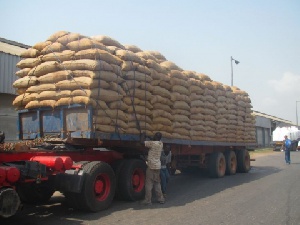Ghana plans to raise its fixed cocoa price next season to a level which ensures smuggling into neighbouring grower Ivory Coast is not attractive, the chief executive of cocoa sector regulator Cocobod said.
Ghana's falling cedi currency has fuelled smuggling of cocoa into Ivory Coast since October, reversing a trend.
"The government is doing everything to get the cedi stabilised and it is our hope that by September this will have been sorted out so that when the new price is fixed, farmers will be more comfortable and it will be a disincentive for anybody to attempt to smuggle," Cocobod's Chief Executive Stephen Opuni said.
When prices were set for the 2013/14 season which started on October 1, Ghana's price of 3,392 cedis per tonne was roughly on par with Ivory Coast's minimum guaranteed farmer price of 750 CFA francs ($1.59) per kg.
However, the cedi has fallen by more than 20 percent against the dollar this year, creating a gap between the two prices.
"Definitely the price will increase but I cannot tell by how much," Opuni said on the sidelines of the World Cocoa Conference in Amsterdam.
Top grower Ivory Coast plans to raise the fixed farmer price above 800 CFA francs per kg for the season starting on Oct. 1, a source at the country's finance ministry said last month.
Review
Opuni, who was appointed in November, said Ghana plans to review guidelines for the internal marketing of cocoa in the coming months.
In 2012 Cocobod investigated a shortfall of around 70,000 tonnes of beans between official cocoa purchases and its inventory after buyers reported inflated volumes.
At the time, local buyers were overstating cocoa purchases in order to gain advance funding.
"As the regulator we expect anyone who works with us not to violate our guidelines," Opuni said, while declining to give details of what the review would entail.
"Before the next season begins we will have done the review."
The world's second largest producer also plans the expand the volume of beans processed locally to up to 40 percent, from around 25 to 30 percent, Opuni said, adding that some plants already have expansion plans.
Ghana could produce up to 900,000 tonnes of cocoa in the coming 2014/15 crop, on par with the International Cocoa Organization's forecast for the country's current crop, Opuni said.
Business News of Thursday, 12 June 2014
Source: Reuters













